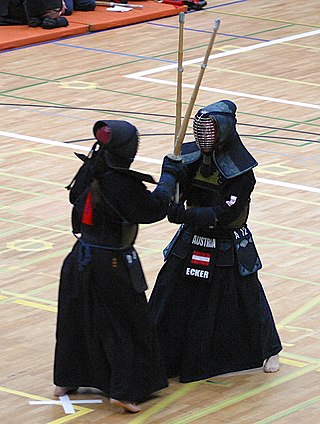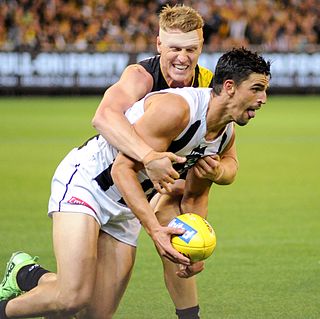Related Research Articles

Kendo is a modern Japanese martial art, descended from kenjutsu, that uses bamboo swords (shinai) as well as protective armor (bōgu). Today, it is widely practiced within Japan and has spread to many other nations across the world.

A knockout is a fight-ending, winning criterion in several full-contact combat sports, such as boxing, kickboxing, muay thai, mixed martial arts, karate, some forms of taekwondo and other sports involving striking, as well as fighting-based video games. A full knockout is considered any legal strike or combination thereof that renders an opponent unable to continue fighting.
Martial arts are codified systems and traditions of combat practiced for a number of reasons such as self-defense; military and law enforcement applications; competition; physical, mental, and spiritual development; entertainment; and the preservation of a nation's intangible cultural heritage.
Reiki is a Japanese form of energy healing, a type of alternative medicine. Reiki practitioners use a technique called palm healing or hands-on healing through which, according to practitioners, a "universal energy" is transferred through the palms of the practitioner to the patient, to encourage emotional or physical healing.
Scientific skepticism or rational skepticism, sometimes referred to as skeptical inquiry, is a position in which one questions the veracity of claims lacking empirical evidence. In practice, the term most commonly references the examination of claims and theories that appear to be beyond mainstream science, rather than the routine discussions and challenges among scientists. Scientific skepticism differs from philosophical skepticism, which questions humans' ability to claim any knowledge about the nature of the world and how they perceive it, and the similar but distinct methodological skepticism, which is a systematic process of being skeptical about the truth of one's beliefs.

A séance or seance is an attempt to communicate with spirits. The word séance comes from the French word for "session", from the Old French seoir, "to sit". In French, the word's meaning is quite general: one may, for example, speak of "une séance de cinéma". In English, however, the word came to be used specifically for a meeting of people who are gathered to receive messages from ghosts or to listen to a spirit medium discourse with or relay messages from spirits. In modern English usage, participants need not be seated while engaged in a séance.

Full contact karate is any format of karate where competitors spar full-contact and allow a knockout as winning criterion.
Therapeutic touch, known by some as "non-contact therapeutic touch" (NCTT), is a pseudoscientific energy therapy which practitioners claim promotes healing and reduces pain and anxiety. "Therapeutic Touch" is a registered trademark in Canada for the "[s]tructured and standardized healing practice performed by practitioners trained to be sensitive to the receiver's energy field that surrounds the body;...no touching is required."
A debunker is a person or organization that exposes or discredits claims believed to be false, exaggerated, or pretentious. The term is often associated with skeptical investigation of controversial topics such as UFOs, claimed paranormal phenomena, cryptids, conspiracy theories, alternative medicine, religion, or exploratory or fringe areas of scientific or pseudoscientific research.

A strike is a directed physical attack with either a part of the human body or with an inanimate object intended to cause blunt trauma or penetrating trauma upon an opponent.

In the fictional Star Trek universe, the Vulcan nerve pinch is a fictional martial arts technique used mainly by Vulcans to render unconsciousness by pinching a pressure point at the base of the victim's neck.
Neigong, also spelled nei kung, neigung, or nae gong, refers to a series of internal changes that a practitioner goes through when following the path to Dao, and these changes may be achieved through practices including qigong or tai chi. Neigong is also associated with xingyi quan.

A contact sport is any sport where physical contact between competitors, or their environment, is an integral part of the game. Contact may come about as the result of intentional or incidental actions by the players in the course of play. This is in contrast to noncontact sports were players often have no opportunity to make contact with each other and the laws of the game may expressly forbid contact. In contact sports some forms of contact are encouraged as a critical aspect of the game such as tackling, while others are incidental such as when shielding the ball or contesting an aerial challenge. As the types of contact between players is not equal between all sports they define the types of contact that is deemed acceptable and fall within the laws of the game, while outlawing other types of physical contact that might be considered expressly dangerous or risky such as a High tackle or Spear tackle, or against the spirit of the game such as striking below the belt or other unsportsmanlike conduct. Where there is a limit as to how much contact is acceptable most sports have a mechanism to call a foul by the referee, umpire or similar official when an offence is deemed to have occurred.

A roundhouse kick is a kick in which the practitioner lifts the knee while turning the supporting foot and body in a semicircular motion, extending the leg striking with the lower part of the shin and/or the instep. The ball of the foot can also be used to strike the target and is preferable when power breaking thick boards. This type of kick is utilized in many different martial arts and is popular in both non-contact and full-contact martial arts competitions. The kick has many variations based on stance, leg movement, striking surface, and the height of the kick.
The one-inch punch is a punching exercise from Chinese martial arts performed at a range of 0–15 cm (0–6 in). The one-inch punch was popularized by actor and martial artist Bruce Lee. It is purported to improve punching power and technique.

Donald Glen Wilson, nicknamed "The Dragon", is an American martial artist, film actor, and former professional kickboxer. An 11-time world champion who scored 47 knockouts in four decades, he has been called by the STAR System Ratings as "perhaps the greatest kickboxer in American history. He has disposed of more quality competition than anyone we've ever ranked".
George Dillman in Philadelphia, Pennsylvania is an American martial arts instructor who popularized the use of techniques such as pressure points among the United States' martial arts practitioners. Dillman is a member of Black Belt magazine's Hall of Fame, and in 1997 was named Black Belt Magazine's "Martial Arts Instructor of the Year". For 30 years, he ran the Northeast Karate Championships. Dillman also conducts martial arts training seminars at the former Muhammad Ali training camp at Deer Lake, Pennsylvania. Dillman has been subject to scrutiny stemming from the fact that many of his most famous techniques don’t work, especially those involving alleged touchless chi manipulation.

A psychic reading is a specific attempt to discern information through the use of heightened perceptive abilities; or natural extensions of the basic human senses of sight, sound, touch, taste and instinct. These natural extensions are claimed to be clairvoyance (vision), clairsentience (feeling), claircognisance and clairaudience (hearing) and the resulting statements made during such an attempt. The term is commonly associated with paranormal-based consultation given for a fee in such settings as over the phone, in a home, or at psychic fairs. Though psychic readings are controversial and a focus of skeptical inquiry, a popular interest in them persists. Extensive experimentation to replicate psychic results in laboratory conditions have failed to find any precognitive phenomena in humans. A cold reading technique allows psychics to produce seemingly specific information about an individual from social cues and broad statements.
The touch of death refers to any martial arts technique reputed to kill using seemingly less than lethal force targeted at specific areas of the body.
A pet psychic is a person who claims to communicate by psychic means with animals, either living or dead. The term psychic refers to the claimed ability to perceive information unavailable to the normal senses by what is claimed to be extrasensory perception. It is the opinion of scientific skeptics that people believe in such abilities due to cognitive biases and the use of various techniques by the practitioners, including intentional deception.
References
- 1 2 "No touch martial arts master meets reality". mixedmartialarts.com. Archived from the original on 27 October 2017. Retrieved 7 March 2022.
- ↑ "Martial Art Pretenders: A History of Imitators and Snake Oil". Fightland. Archived from the original on 3 December 2020. Retrieved 7 March 2022.
- 1 2 Dunning, Brian (19 January 2010). "Skeptoid #189: Bullshido: Martial Arts Magic". Skeptoid . Retrieved 7 March 2022.
- ↑ "What Martial Arts Have to Do With Atheism". The Atlantic. 25 April 2013. Retrieved 19 August 2015.
- ↑ "After Showing Up to His Live Event, Skeptics Debunk Promoter of 'Touchless' Karate". Friendly Atheist. Retrieved 19 August 2015.
- ↑ "Yellow Bamboo". skepdic.com. Retrieved 19 August 2015.
- ↑ "The Ancient Art of Yellow Bamboo". Museum of Hoaxes. Retrieved 19 August 2015.